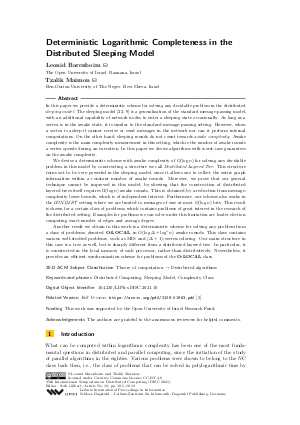@InProceedings{barenboim_et_al:LIPIcs.DISC.2021.10,
author = {Barenboim, Leonid and Maimon, Tzalik},
title = {{Deterministic Logarithmic Completeness in the Distributed Sleeping Model}},
booktitle = {35th International Symposium on Distributed Computing (DISC 2021)},
pages = {10:1--10:19},
series = {Leibniz International Proceedings in Informatics (LIPIcs)},
ISBN = {978-3-95977-210-5},
ISSN = {1868-8969},
year = {2021},
volume = {209},
editor = {Gilbert, Seth},
publisher = {Schloss Dagstuhl -- Leibniz-Zentrum f{\"u}r Informatik},
address = {Dagstuhl, Germany},
URL = {https://drops.dagstuhl.de/entities/document/10.4230/LIPIcs.DISC.2021.10},
URN = {urn:nbn:de:0030-drops-148123},
doi = {10.4230/LIPIcs.DISC.2021.10},
annote = {Keywords: Distributed Computing, Sleeping Model, Complexity Class}
}

 Creative Commons Attribution 4.0 International license
Creative Commons Attribution 4.0 International license
